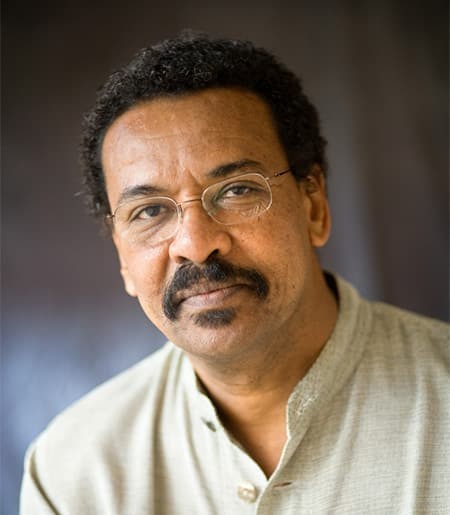Salah Hassan, Distinguished Professor of Arts and Sciences in Africana Studies, has been elected as the 2021 Distinguished Scholar by the College Art Association, the largest and oldest scholarly and professional association in the field of art history. The honor was celebrated with a special session at the CAA 2021 Annual Meeting in February.
Hassan, an art historian, art critic and curator, is an expert on African and African Diaspora art history and visual cultures. He focuses particularly on contemporary art and modernism from comparative perspectives.
"Salah Hassan's scholarship and curatorial work have been deeply formative in bringing recognition to the study of modern and contemporary African and African diaspora art," said Iftikhar Dadi, associate professor and chair of the Department of History of Art. "As a result of the sustained efforts of a small number of scholars, foremost among them Salah Hasan, this field is now among the most vital in the discipline."
"I am of course humbled by such an honor from the leading scholarly organization in my field. I am also happy as it signals a major shift in a field that has for so long remained Eurocentric, and in which arts of regions such as Africa, Asia and Latin America remained an appendix to, or a derivative of, the western narrative," Hassan said. As he further emphasized, such an honor also signaled, "a shift towards a more global and comparativist approach to art history and visual culture, a vindication to the relentless effort of several scholars in the last two or three decades."
This honor by the CAA, the main professional association in the discipline of art history, recognizes Hassan's scholarly contributions in writing, editing, publishing, curating exhibitions on "major but neglected artists," and training doctoral students, said Dadi, who completed his Ph.D. under Hassan' supervision at Cornell in the Department of History of Art in 2003, focusing on the modern art of South Asia.
"Although my own area is primarily not the art of Africa or its diaspora, there were many common frameworks that we shared, which included the relevance of postcolonial approaches to the study of modern art of the non-Western world and the global South," Dadi said. "Salah Hassan has always recognized that the issues that are relevant for modern culture in Africa, and the questions that its diaspora subjects face, are also encountered by other regions and their diasporas from the global South. Consequently, approaches that emphasize comparison and critical cross disciplinary perspectives are extremely salient in addressing the modern art of these regions and peoples."
Hassan said that as a specialist in contemporary and modern art, he has experienced the richness that artists from Africa and the African diaspora have brought to the forefront of creativity and artistic excellence: "They have been at the cutting edge of shaping modern and contemporary art, and yet their revolutionary efforts, which have even influenced major western artists and movements, have been totally ignored and under-recognized," he said. "My motivation has been to expand the narrative of art history and shift it towards a more global vision by reinserting their stories, where it should fit."
Hassan further contributed to "a broad and deep study of global modern art" by serving on doctoral committees for several students working on various geographic areas and topics, Dadi said. Hassan was chair of Cornell's Department of History of Art from 2001 to 2006, with the vision to reorient the department to emphasize comparison, global perspectives and emerging topics.
Hassan founded the Institute for Comparative Modernities at Cornell to provide a cross-disciplinary space for research and scholarship, workshops and conferences, fellowships for visiting scholars and artists, and graduate student activities.
He is co-founder and co-editor of "Nka: Journal of Contemporary African Art" (Duke University Press), the leading contemporary art journal on African and African diaspora art, among other editorial projects.
Recently, Hassan co-organized a major conference at the Tate in London, "Axis of Solidarity: Landmarks, Platforms, Futures," in February 2019. Developed as the first large-scale event of the newly inaugurated Hyundai Tate Research Centre: Transnational, the conference was held in collaboration with the Institute for Comparative Modernities and The Africa Institute of Sharjah. The conference revisited the international solidarity movements that emerged in the second half of the twentieth century during the era of decolonization in Africa, Asia and Latin America.
Hassan's groundbreaking curatorial projects have focused on important artists previously overlooked due to the longstanding Eurocentrism of the museum world, Dadi said. He curated "Unpacking Europe," a major exhibition in 2001 at the Museum Boijmans Van Beuningen in Rotterdam, Netherlands featuring some 20 international artists that critically examined Europe's legacies in its relationship with the rest of the world. Hassan's other major exhibitions have focused on diverse movements in African and African-American modern and contemporary art, such as Surrealism in Egypt, and the Khartoum School of Art.
His book "Ibrahim El Salahi: A Visionary Modernist," was published in 2012 in conjunction with the retrospective of the Sudanese artist, Ibrahim El Salahi, which was exhibited at the Tate Modern in London in 2013 after premiering in the Sharjah, UAE, the first-ever retrospective exhibition of an African artist in a major Western museum.
Hassan has authored, edited and co-edited several books including "Darfur and the Crisis of Governance: A Critical Reader" (2009) and "Diaspora, Memory, Place" (2008). Most recently, he has been on a series of publications related to The Khartoum School and the Modern Art Movement in Sudan, and on the Egyptian Surrealism supported by the Sharjah Art Foundation.
He is the recipient of several grants and fellowships, such as the J. Paul Getty Postdoctoral Fellowship, as well as major grants from the Sharjah Art Foundation, Ford, Rockefeller, Andy Warhol and Prince Claus Fund foundations.







